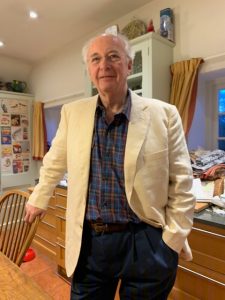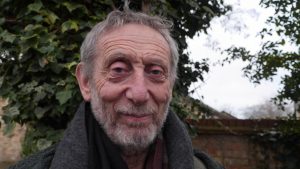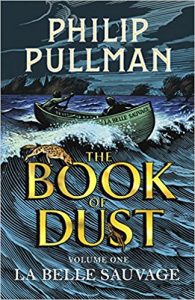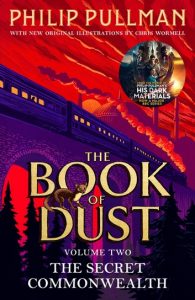Centre for Language, Culture and Learning Online Event – 21 May 2021
5.30 pm – Welcome from Head of Centre for Language, Culture and Learning – Vicky Macleroy
5.35 pm – Introduction by Head of MA Children’s Literature programme – Julia Hope
5.40 pm – 6.40 pm – Philip Pullman in conversation with Michael Rosen
6.40 – 7.00 pm – Questions from panel of MA /PhD Children’s Literature students – Alice Penfold, Mette Lindahl-Wise, Seraphina Simmons-Bah, Louis Garratt


What happens when you bring together two leading figures in the field of children’s literature?
We share some reflections and highlights from this brilliant event which was first planned between these two long-time friends and prolific well-known writers over a year ago. Originally planned as a live event (the week we went into lockdown and before Michael nearly died from COVID-19), the event was then transformed into an online conversation.
Michael Rosen is Professor of Children’s Literature and in the Centre for Language, Culture and Learning at Goldsmiths. Julia Hope, Head of the MA Children’s Literature programme at Goldsmiths, introduced Michael Rosen and Philip Pullman in a warm, witty, political way that set the tone for this special event giving us a glimpse into the lives of these highly esteemed writers in the field of children’s literature.
Michael framed the conversation with his questions and the ebb and flow of the discussion was a real pleasure. Philip spent much of his childhood at sea and remembers being on the water and the movement of the sea and this sense of impermanence and ‘nowhere that I can really call home’. We heard that his mother used to write poetry and he had loved the rhythm of Hiawatha as a child and read ‘with enormous glee’ the Just So Stories and How the Camel got its Hump’. Philip shared his enjoyment of comics – swift and quick moving – Superman, Batman, The Eagle and Michael remembered becoming an ‘aficionado’ of comics but with his father’s running ideological commentary in his ear.
Philip and Michael reminisced about their time at Oxford and the odd disjuncture with figures in academia at that time and obstacles put in the way of success. Philip thoughtfully remarked that: ‘If I had my time again, I would have been a furniture maker’.
Michael moved onto talking to Philip about his earlier books and the influence of children’s writers on him such as Leon Garfield, Owl Service. Philip talked about reading Paradise Lost and words in poetry and how his ‘skin bristled’ and he was ‘intoxicated, spellbound by these words, what words, what phrases, how do you find words like that?’. He also talked about loving ballads and folk music.
We were given a rare treat into Philip’s current writing on the last book in the trilogy of The Book of Dust. In this book, Philip wanted to send Lyra, to Central Asia, to near Aleppo, but Aleppo one hundred years ago when it was a happy, thriving, bustling, busy, joyful place. Pantalaimon has decided Lyra has lost her imagination (because of certain books she has been reading) and has to leave Lyra to find her imagination and go east (to the Tian Shan Mountains in Western China). Lyra is following him and she is now in Syria, meeting strange events and strange people. Philip sees this novel turning into a romance, smaller scale than an epic, and about an individual questing for lost love. He was on p. 132 of writing the book at the time of talking and we eagerly await its publication.
Panellist reflections
The event was then opened up for the 4 panellists to ask their questions and they reflect here on the questions and Philip’s responses.
Strong female characters (Mette Lindahl-Wise)
My question to Phillip stemmed from my interest in girlhood, feminism and children’s literature and I asked Phillip where his strong female characters came from – was he inspired by particular people or literary characters? Philip explained that he never sets out to create strong female characters for ideological purposes or to prove a particular political point, they just ‘turn up like that’. However, never having been a girl himself he is interested in examining female characters through the omniscient narrator, a non-human ‘spright’ ‘whose voice it is a privilege to inhabit’. Drawing on his many years as a teacher and observing classroom dynamics to create his many fabulous female characters like Lyra, Alice, Sally, Lila the fire-maker’s daughter he said there had been a ‘Lyra’ in every class he taught. Fascinating!
Fantasy genre (Alice Penfold)
My PhD research is focused on representations of mental health in young adult fantasy fiction. Due to my interest in genre, I asked Philip why he had chosen the fantasy genre for many of his novels and what unique possibilities he believes that the genre offers. Philip offered a very thoughtful and honest response and outlined how the ideas for his novels came to him before choosing a specific genre. I was particularly interested in his comment on the possibilities of fantasy to escape everyday reality and also for using fantasy to represent growing up, as shown in His Dark Materials through the fact that the daemons of young people (such as Lyra) can change, whereas those of the adults stay the same. It was such a pleasure to hear Philip’s answers and his conversation with Michael and to be reminded of the power that fiction has to help adult and young adult readers alike to make sense of ourselves and the world around us.
Anthropomorphism (Seraphina Simmons-Bah)
As I have been exploring the use of anthropomorphism as part of my research into societal power structures and children’s literature, I asked Philip about his use of the device through the daemons in His Dark Materials. Philip built on his answers to Mette and Alice’s questions, explaining that there was no deliberate ideological rationale for how he used the daemons, but fondly recalled the moment that he had had the idea to make it possible for children’s daemons to change whilst adult daemons cannot. When listening to Philip’s responses, what struck me the most was just how inspired he is by children and the resilience and adaptability they can have.
Writing prose (Louis Garratt)
As a writer who aspires to the swiftness and clarity of Philip’s works, my question was if there is a rule, or set of rules or practices, that Philip adheres to when writing prose to capture the reader and instil a swiftness to the text. Philip’s response was to emphasise the importance of good habits, commenting that ‘habit has written far more books than inspiration has’. It is more beneficial and realistic to have an accomplishable routine when setting out on the task of writing. Philip also commented on my admiration for nonsense literature, naming The Phantom Tollbooth by Norton Juster as well as the Alice books of Lewis Carrol, as examples of texts that are stitched together in a logical manner that aids the reader’s immersion.
Returning to Michael Rosen and Philip Pullman at the end of the panel discussion, Michael talked about how Philip had taken us on a roundabout route through story and posed the question:
What does story give us?
You can watch a recording of the event here.
Afterword
Philip Pullman shared some pages with us afterwards of his work in progress.
These words are not for reproduction or publication outside of this blog (and not to be posted on social media).
Work in progress
Lyra listened. The silence was vast. It was the sort of night when you might hear the planets moving among the stars. She found herself comparing it with the silence in the world of the dead, but that was a closed silence, where nothing was alive, and that world was stale and stuffy, for all its immensity. But the silence in Al-Khan al-Azraq was open, and not quite silence either; there were little scratches, little susurrations and clicks and rasps, none of them louder than a pinch of sand dropped on the skin of a snare drum, and they all meant … Nothing. She remembered a night some years before, in Oxford, when she had thought that everything had a meaning, and had seen how she might understand it. But that was before she’d read Gottfried Brande and Simon Talbot, at a time when Pan was still happy with her.
“You can’t hear them?” said Nur Huda.
She spoke tentatively, anxious that Lyra should believe her, and Lyra saw how young the girl was, and how much she’d suffered, and felt how tightly Nur Huda was still gripping her arm.
“Yes, I can a bit, but I don’t know what they’re saying. Is this the best place to listen to them?”
“It’s better in the market place. This way.”
They had to clamber over the fallen stones and make their way around the broken walls of a basilica before they came to an open area that did look like a market place, a public space to hold meetings: a forum.
The sand underfoot was so fine and white that it might have been newly-milled flour. In the centre of the forum there was a plinth where a statue had once stood. The statue itself lay in three pieces beside it, toppled by an earthquake, perhaps: a bearded god whose sightless eyes glared up at the moon. Lyra and Nur Huda sat on his muscular chest. There was nothing moving in the forum, not a sign of life anywhere, and everything around was drenched in moonlight and frozen in stillness.
Lyra gradually became more aware of the scratchy little susurrus, the scraping of insect claws, the clicks and rustlings like dry leaves in a porcelain bowl being stirred by a breeze. The girl’s arm pressing against hers, her flesh warm in the cold air, made Lyra realise a little of what their dæmons must be feeling, so bare and vulnerable away from the solid comfort of a human body.
She gathered her breath to say something, but Nur Huda whispered “Sssh …”
Lyra could hear no difference in the tiny scratchings and scrapes. She strained to hear better, and tried to focus her ears on whatever was there, and then remembered Giorgio Brabandt telling her how to see the secret commonwealth: You got to look at it sideways, he’d said. Out the corner of your eye. So you gotta think about it out the corner of your mind. It’s there and it en’t, both at the same time.
Of course. She shouldn’t strain at it. She relaxed her mind and her eyes and her ears, and let the night flow in and out of her body. A nimbus of perception spread out around her as if her senses themselves were slowly merging with the city of the moon.
And in the clicks and rasps and scratches she began to hear words:
… you alone … we will talk only to you … what we have to say is not for the world to know …
Then she said into the dark “Who are you? Are you angels?”
… we are beings of another kind …
“Are you part of the secret commonwealth?”
… deeper by far than that … we come from the gulfs between the good numbers …
“The gulfs between … Did I hear you properly?”
No reply.
Philip Pullman
From The Book of Dust, Part 3
NOT FOR PUBLICATION OR REPRODUCTION OUTSIDE OF THIS BLOG
Many thanks to Philip for this rare glimpse into a ‘work in progress’.

 The Book of Dust, Part 3
The Book of Dust, Part 3
You can find information about the MA Children’s Literature programme at Goldsmiths which has 3 pathways: MA Children’s Literature: Issues and Debates; MA Children’s Literature: Creative Writing Pathway; MA Children’s Literature: Children’s Book Illustration.
Blog by Vicky Macleroy (with panellist reflections by Mette Lindahl-Wise, Alice Penfold, Seraphina Simmons-Bah, Louis Garratt)